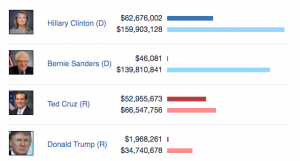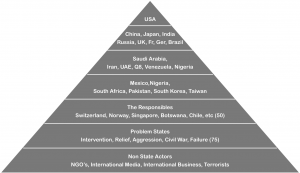As the American presidential election drags on, my European friends and colleagues constantly ask me about the chances that Donald Trump actually has in winning the nomination of the Republican Party and eventually the general election in November. For many of them the primary system is confusing at best and seems a little silly.
As I have written in an earlier post, there are three key things to keep in mind when observing the process. The first one is that the Republican and Democratic parties are two private organizations that made up their own rules on how to choose their candidates and can do essentially whatever they like subject to their own procedures and governance structures.
The second is that the process plays out across 50 States which are still semi autonomous entities within the United States and that each party’s organization in each state is also separate from the party’s national structure. They are more like franchises than anything else and often have their own rules for selecting state level candidates and the delegates to the national conventions which is where the candidates are formally selected.

The third is that there is an enormous amount of money being spent on this election which opensecrets.org says is over $ 1billion between the political action committees and the candidates themselves. The political action committees are the darker bars in the graph to the right and by law the candidates and their campaigns can have no influence or communication with them.
Where Are We ?
At this time the outcome on both sides is uncertain although both Donald Trump and Hillary Clinton are still in the lead.
Trump has 743 delegates according to realclearpolitics, a web site, and needs 1,237 before the Republican convention starts in Cleveland on July 18th in order to have a majority in the first round of voting. There are still 769 delegates in play in the 16 States left which means he would need to win 64% of the remaining votes. Some of these States, such as New York (95 delegates, April 19th) award delegates proportionally and others have a winner take all policy such as Pennsylvania (71 , April 26) and California (172, June 7th) . If Trump were to win California, where he is ahead in the polls, he would only need 53% of the remaining delegates and that looks possible seeing how he should do well in New York and New Jersey.
Ted Cruz is betting that Trump will not have enough votes on the first round and then can convince supporters of Governor Kasich and others who have already dropped out to support him on the second or third round when party rules at the State level allow delegates to switch their votes. Governor Kasich has a plan which involves winning Pennsylvania and getting to the convention as the only grown up who can bring the party together.
On the democratic side Hillary Clinton is still ahead of Bernie Sanders 1,280 to 1,061 when looking at the delegates she won in the primaries according to realclearpolitics. The Democrats will choose 4,051 delegates in the primaries but also give delegate status to 712 party officials and political representatives who are referred to as super-delegates so that the total is 4,763 and either candidate needs 2,382 to win.
Of these super-delegates 469 have pledged their support for Ms. Clinton and only 31 for Sen. Sanders. The problem for Hillary is that these people can change their mind at anytime before the voting starts at the Democratic Convention in Philadelphia on July 25th. Sen. Sanders believes that if he has more delegates from the primaries he will be able to “flip” these delegates as the politicians may not choose to go against “the will of the people”.
All of the Democratic contests are proportional and the critical states are again New York (247), Pennsylvania (189) and California (475).
Does it Matter ?

I try to follow the election as closely as I can because I find it highly entertaining and potentially very important. In Power Rules, Leslie H. Gelb puts forth an image of a pyramid of power in the world with the U.S. at the top.
The idea is that the United States can not and should not act alone in the world but that it is difficult to imagine the world solving important problems without the U.S. given its overwhelming military and economic power.
His point in the book is that power needs to be used wisely and we need wise people to wield it. Only three of the current set of candidates is qualified to wield this power in my private opinion. Two are Democrats and one is the Governor of Ohio.


Good post. I like your statement: ” .. it is difficult to imagine the world solving important problems without the U.S. given its overwhelming military and economic power.” I would also add that the great power of the U.S. is also in its leadership in innovation and entrepreneurship. Almost all recent innovations, entrepreneurial ventures and e-business models were first invented in the U.S. , then spread around the world later on.
Thank you for sharing your insights.
I’m actually in Cleveland, Ohio! And I have a strong feeling that Governor Kasich is going to surprise a lot of people. Personally, I may not agree with his position on all of the issues that are at stake. However, as a former Cleveland school board member some years ago, I saw him bring people together from both sides of the aisle to approve important urban education reforms. He is a very practical, no-nonsense type of leader that will do what actually works and won’t hold on to status quo. Therefore, I don’t doubt that he has the potential to emerge as a sensible alternative to Trump or Cruz.
Very interesting post!
I also believe that it is difficult to imagine the world solving important problems without the U.S, but power, as you say, has to be used wisely and we need wise people to wield it.
Although Indiana still might give a jolt to the Republican nomination fight, it looks like it will be down to California. The way the rules work there is that it is winner take all by congressional district so that the candidates will need to devote time and money to different parts of the state where they think they can win. Ted Cruz is betting that Carly Fiorina, former CEO of HP, will help him win in enough districts to deny Trump the 1,237 he needs to win on the first ballot at the convention in Cleveland.
Trump currently has 946 delegates (according to realclearpolitics) which means he needs an additional 243 or about half of the 502 delegates still in play.